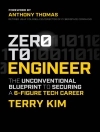This book is a timely document of state-of-the art analytical techniques in the domain of stream cipher design and analysis with a specific cipher, named ZUC. It links new research to brief contextual literature review in the domain of complex LFSR-based stream ciphers. A snapshot of how stream ciphers are deployed in the mobile telephony architecture, one of the most well-known topics for more than five decades in the domain of computer and communication sciences, is presented in this book. The book provides an in-depth study on design and cryptanalysis of ZUC as well as relevant research results in this field with directions towards future analysis of this cipher.
表中的内容
1. Introduction and Preliminaries.- 2. Introduction and Preliminaries.- 3. Introduction and Preliminaries.- 4. Introduction and Preliminaries.- 5. Introduction and Preliminaries.- 6. Test Vectors for ZUC.
关于作者
CHANDRA SEKHAR MUKHERJEE
is a postgraduate student of computer science at the Indian Statistical Institute, Kolkata, India. He received his undergraduate degree in computer science from Heritage Institute of Technology, Kolkata, India, in 2019. He got introduced to theoretical computer science during his pre-final year of undergraduate studies after which he explored the areas of computational geometry and graph algorithms. His inclination towards finding patterns within random behavior of objects got him attracted to combinatorial algorithms and number theory. The deep connection between probability, combinatorics and number theory which leads to the fine line between randomness and bias deeply intrigued him in the domain of cryptology. His current areas of research include cryptology and quantum information theory. Being in the formative years of his research career, he wishes to meaningfully contribute to the broad area of secure communication.
DIBYENDU ROY is a postdoctoral research fellow at the Indian Statistical Institute, Kolkata, India. He obtained his Ph.D. and M.Sc. in Mathematics from the Indian Institute of Technology Kharagpur, India. Earlier, he was a consultant at ERTL (E), STQC, Kolkata, India, and worked in the domain of security analysis. He was also a postdoctoral fellow at the National Institute of Science Education and Research, India, for two years. His primary research area is cryptology, more specifically the domain of symmetric ciphers. His research articles have been published in journals of repute.
SUBHAMOY MAITRA is Professor at the Indian Statistical Institute (ISI), Kolkata, India. He received his Ph.D. in computer science from the ISI, Kolkata. He holds a postgraduate degree in computer science from the ISI, Kolkata, and undergraduate degree in electronics and telecommunications engineering from Jadavpur University, Kolkata, India. After working briefly in the domain of hardware and software engineering, he joined the ISI, Kolkata, as a faculty in 1997. He has authored several books and around 200 research papers in various fields of cryptology and quantum information.












